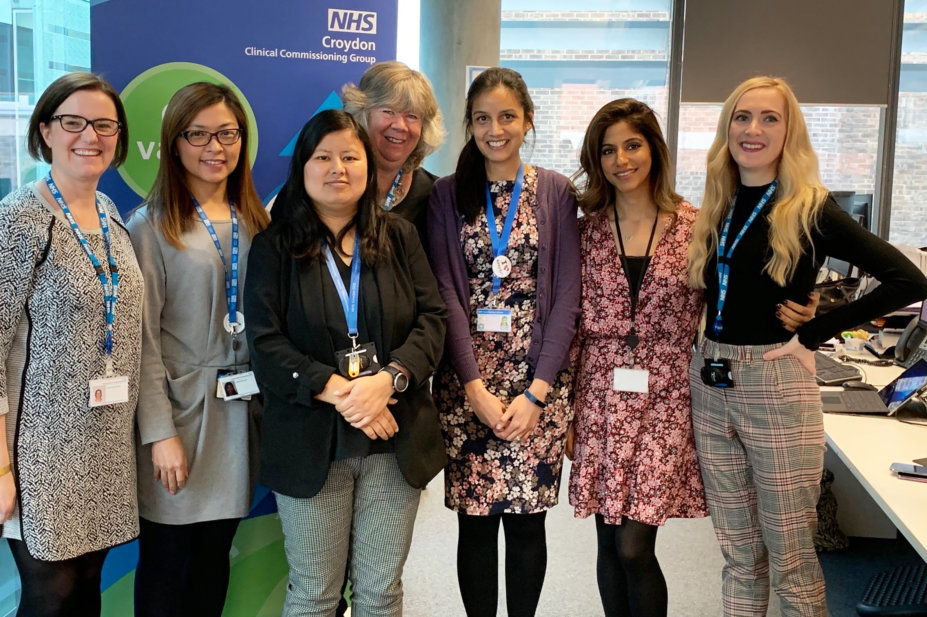
Shazia Karsan
In Croydon, health and social care providers and commissioners have adopted a whole systems approach known as outcomes-based commissioning (OBC) to transform the delivery of health and social care for older people. Outcomes based commissioning rewards outcomes that matter to the residents of Croydon instead of payments based on numbers, moving away from the traditional volume based commissioning approach. An external review in 2017 revealed that Croydon had a higher than expected non-elective admissions rate and poor integration of services compared with peer clinical commissioning groups. This led to the development of integrated community networks (ICNs) to address this, and a successful case was made for a new integrated care clinical pharmacy service as part of this. Other ICN members include social workers, nurses, GPs and personal independence co-ordinators (PICs).
Our team is made up of six specialist clinical pharmacists that support patients to use their medicines appropriately and independently for as long as possible. Croydon is split into six networks and each pharmacist is the lead pharmacist for their own network. We attend multidisciplinary meetings known as “huddles” at each GP practice in our network every week or fortnight where complex patients are discussed with the overall aim of keeping them out of hospital. We also receive hospital discharge referrals from Croydon University Hospital, where pharmacy staff and other healthcare professionals identify potential or actual medication-related problems for patients at the point of discharge.
We visit patients at home, where a detailed, person-centred consultation is conducted to identify any medication related problems. Once problems have been identified, we then work with the patient, their family and carers, and all relevant parties involved in their care to find solutions to address them. This could be anything from organising monitoring for high risk medications, to working with social workers and domiciliary care agencies to re-align packages of care for time dependent medications. Polypharmacy is a particular concern for many older people and we support patients and prescribers with deprescribing where appropriate. Working as part of the ICN team has also enabled us to look more holistically at the needs of a patient and understand how community, social and healthcare can work together. If during a medication review we also identify that there is a housing or social need we can then refer directly to the network social worker, social prescribing initiatives or befriending services.
A typical day will usually involve attending one or two huddles and visiting a couple of patients. Working in the community means that no two days are the same, and often pre-conceived ideas are proven wrong once we arrive at a visit. We work with vulnerable and housebound patients that have complex needs and who often have difficulty accessing services, and we are always looking for ways to also target hard to reach groups. One of the team members attends an older persons’ drop-in at a health hub and we have recently been invited to attend a Gujarati women’s group to talk about medicines and pharmacy. We also attend monthly falls multidisciplinary (MDT) meetings.
In the first six months of our service being fully rolled out (from April to September 2018), we completed 329 case management episodes and a total of 580 medication related problems were identified equating to an average of 1.8 per patient.
Using an adapted RiO scoring tool to estimate the likelihood that a medication related problem would have led to an admission if we had not intervened, 49 admissions were avoided equating to an estimated saving of £153,135. An additional £15,116 of saving was made following recommended changes to medication regimes to address clinical problems or waste. In addition, the team recorded 470 episodes of patient or carer education, recommended 222 changes to medication regimes, and made 71 referrals to other services or professionals.
I have personally found the role rewarding and insightful. I have the time to really explore and address a patient’s concerns with their medications, which is not always possible to do in busy dispensaries or clinics. Through developing a relationship with my patients, I can get them involved in solving problems and actually see the result of my interventions.
About the author:
Shazia Karsan is an integrated community network pharmacist for the New Addington and Selsdon Network, NHS Croydon Clinical Commissioning Group


